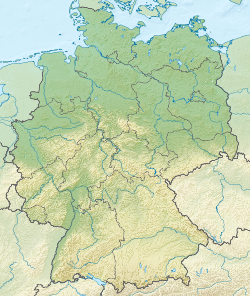Messel shales
 |
|
| UNESCO World Heritage Site | |
|---|---|
| Location |
Germany |
| Criteria | viii |
| Reference | 720 |
| Coordinates | 49°55′03″N 8°45′24″E / 49.9175°N 8.7567°ECoordinates: 49°55′03″N 8°45′24″E / 49.9175°N 8.7567°E |
| Inscription | 1995 (19th Session) |
|
[]
|
|
The Messel Pit (German: Grube Messel) is a disused quarry near the village of Messel, (Landkreis Darmstadt-Dieburg, Hesse) about 35 km (22 mi) southeast of Frankfurt am Main, Germany. Bituminous shale was mined there. Because of its abundance of fossils, it has significant geological and scientific importance. After almost becoming a landfill, strong local resistance eventually stopped these plans and the Messel Pit was declared a UNESCO World Heritage site on 9 December 1995. Significant scientific discoveries are still being made and the site has increasingly become a tourism site as well.
Brown coal and later oil shale was actively mined from 1859. The pit first became known for its wealth of fossils around 1900, but serious scientific excavation only started around the 1970s, when falling oil prices made the quarry uneconomical. Commercial oil shale mining ceased in 1971 and a cement factory built in the quarry failed the following year. The land was slotted for use as a landfill, but the plans came to nought and the Hessian state bought the site in 1991 to secure scientific access. In the few years between the end of mining and 1974, when the state began preparing the site for garbage disposal, amateur collectors were allowed to collect fossils. The amateurs developed the "transfer technique" that enabled them to preserve the fine details of small fossils, the method still employed in preserving the fossils today.
Due to the extraordinary fossils, the pit was declared a UNESCO world heritage site in 1995, one of the few sites that have ever been placed on the list exclusively due to fossils.
...
Wikipedia

